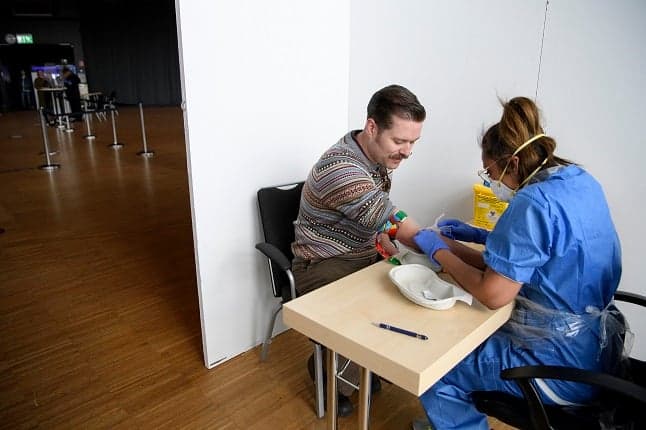One in seven Stockholmers had coronavirus antibody in private tests

Around one in seven people in Stockholm tested positive for coronavirus antibodies in tests carried out by a private company and shared with the Public Health Agency -- but these figures can't be seen as representative for the whole population.
Around 14 percent of people in the Stockholm region, or around one in seven, had antibodies for Covid-19 according to samples provided by private healthcare provider Werlabs.
The company analyzed 50,000 samples between May and mid-June. The samples belong to private individuals and companies who have offered tests to their staff — a service Werlabs provides in certain (mostly urban) regions for the price of 750 kronor for private individuals.
In Gothenburg, the proportion of the tested population carrying antibodies was 11.5 percent, while in Malmö it was just 5 percent. Nationwide, the average was 10.8 percent, though the samples were only taken in specified, more densely populated areas.

One of Werlabs' test centers. Photo: Jessica Gow/TT
But can these be seen as an indication of the spread of the virus more widely in society?
Werlabs’ director Henrik Forsberg said it’s hard to say how representative the results are for the population at large. It might be the case that, for example, people who suspect they have had the virus are more likely to take the test, skewing the results, while the cost and the high representation of staff at major Swedish companies may mean some demographic groups are over-represented.
But these numbers are significantly lower than the Public Health Agency’s previous model that predicted around a quarter of residents of the Stockholm region would have been infected by May 1st.
The agency's first nationwide study into antibodies, based on 1,104 samples, showed that 7.3 percent of the test group in Stockholm carried antibodies in the week ended May 3rd, versus 4.2 percent in Skåne and 3.7 percent in Västra Götaland. It takes two to three weeks for the immune system to develop antibodies, meaning this would show the level of infection two to three weeks before the samples were taken.
Comments
See Also
Around 14 percent of people in the Stockholm region, or around one in seven, had antibodies for Covid-19 according to samples provided by private healthcare provider Werlabs.
The company analyzed 50,000 samples between May and mid-June. The samples belong to private individuals and companies who have offered tests to their staff — a service Werlabs provides in certain (mostly urban) regions for the price of 750 kronor for private individuals.
In Gothenburg, the proportion of the tested population carrying antibodies was 11.5 percent, while in Malmö it was just 5 percent. Nationwide, the average was 10.8 percent, though the samples were only taken in specified, more densely populated areas.

One of Werlabs' test centers. Photo: Jessica Gow/TT
But can these be seen as an indication of the spread of the virus more widely in society?
Werlabs’ director Henrik Forsberg said it’s hard to say how representative the results are for the population at large. It might be the case that, for example, people who suspect they have had the virus are more likely to take the test, skewing the results, while the cost and the high representation of staff at major Swedish companies may mean some demographic groups are over-represented.
But these numbers are significantly lower than the Public Health Agency’s previous model that predicted around a quarter of residents of the Stockholm region would have been infected by May 1st.
The agency's first nationwide study into antibodies, based on 1,104 samples, showed that 7.3 percent of the test group in Stockholm carried antibodies in the week ended May 3rd, versus 4.2 percent in Skåne and 3.7 percent in Västra Götaland. It takes two to three weeks for the immune system to develop antibodies, meaning this would show the level of infection two to three weeks before the samples were taken.
Join the conversation in our comments section below. Share your own views and experience and if you have a question or suggestion for our journalists then email us at [email protected].
Please keep comments civil, constructive and on topic – and make sure to read our terms of use before getting involved.
Please log in here to leave a comment.